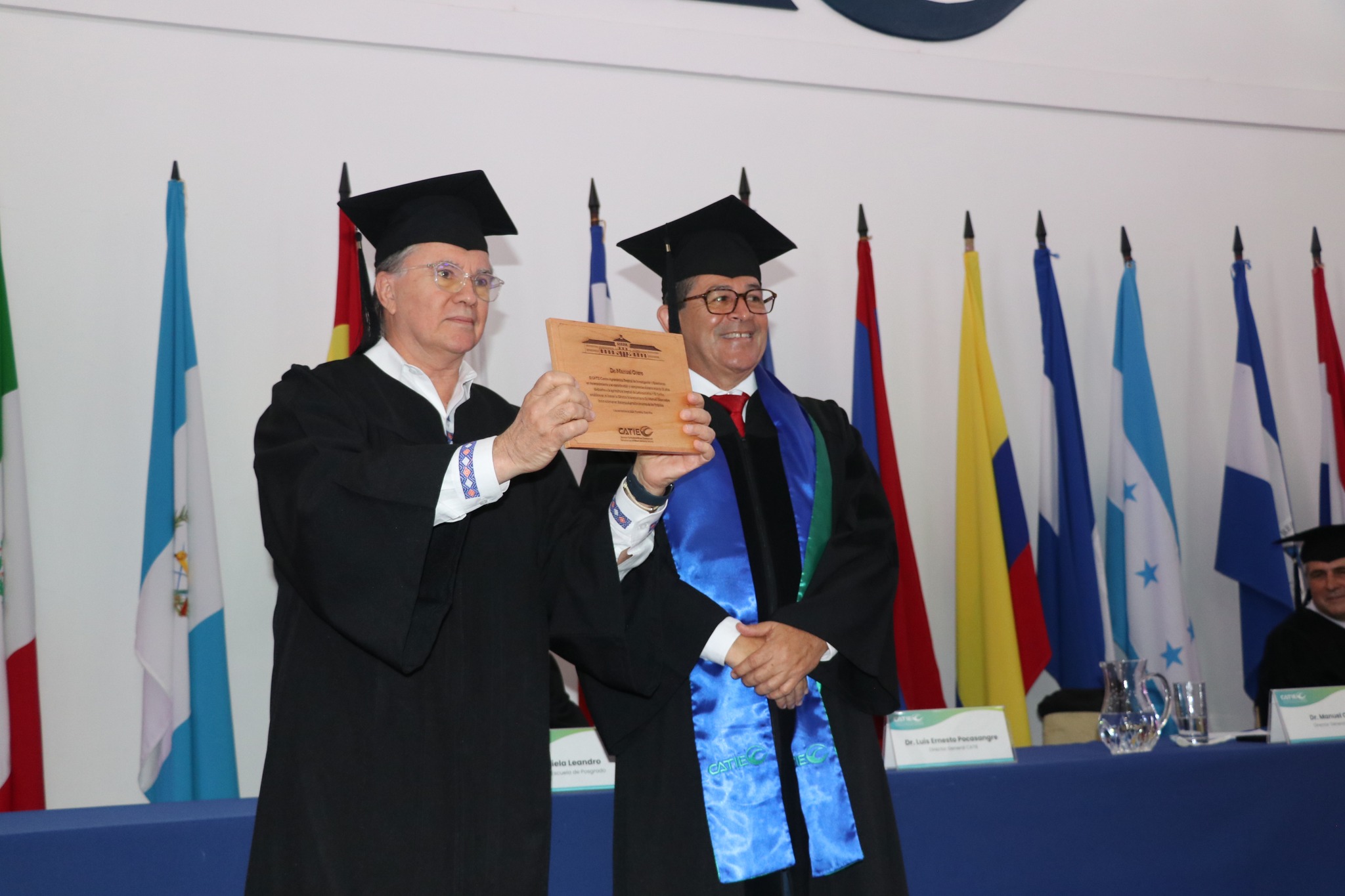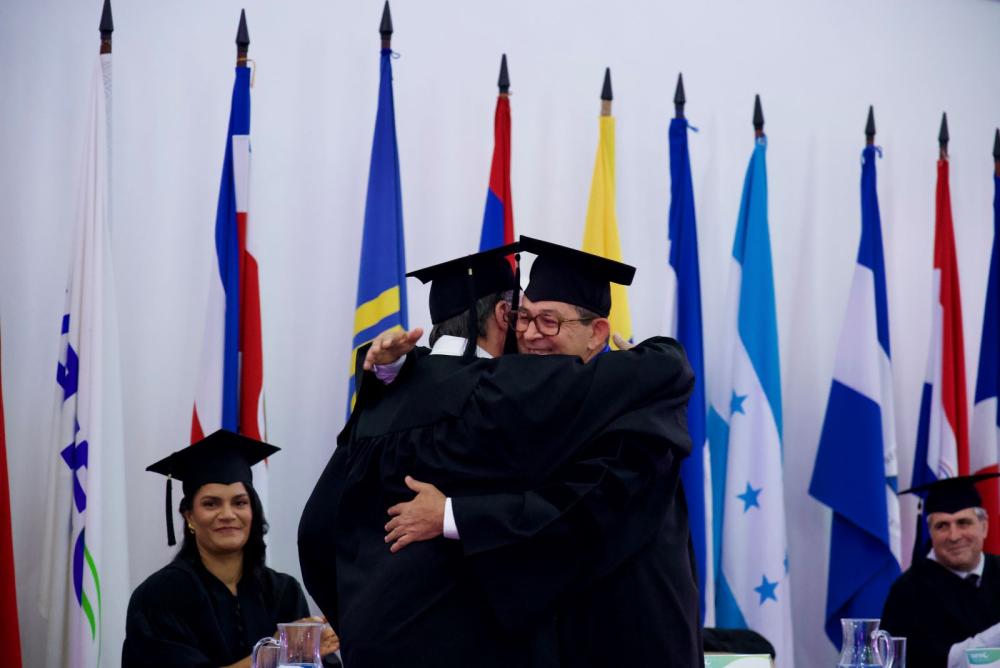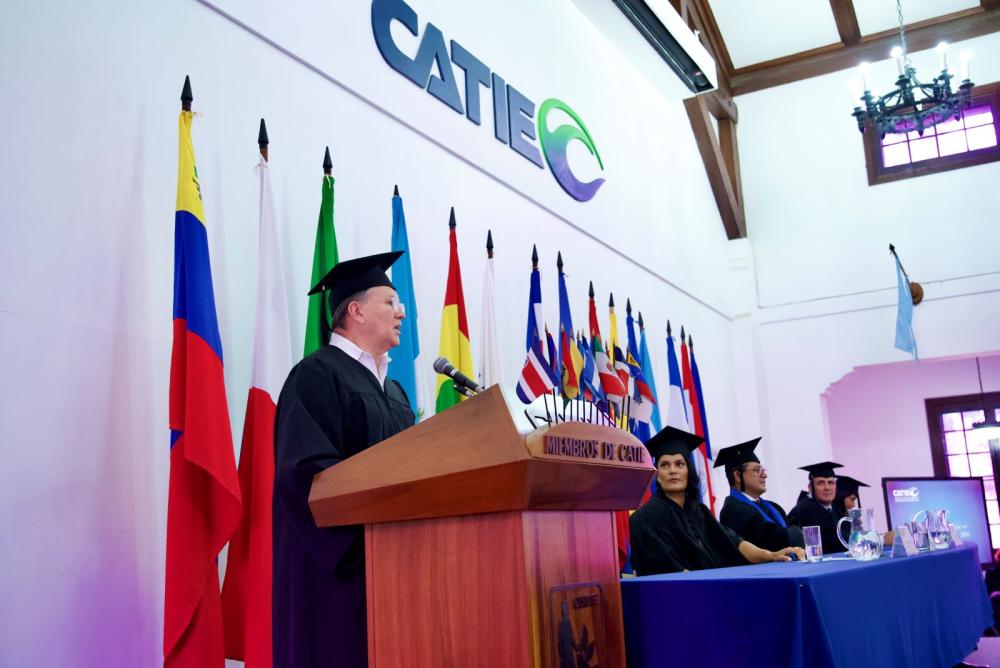The act of recognition of Manuel Otero took place during the graduation ceremony of CATIE’s Master’s Program, honoring his career of over 35 years dedicated to promoting and developing tropical and temperate agriculture in the Americas.

Turrialba, Costa Rica, 5 November 2024 (IICA). The Director General of the Inter-American Institute for Cooperation on Agriculture (IICA), Manuel Otero, received an honorary tribute from the Tropical Agricultural Research and Higher Education Center (CATIE), a prestigious academic institution based in Turrialba, Costa Rica. The center officially announced the creation of the Inter-American Chair on Innovations in Tropical Agriculture and Agrifood Systems, which will bear the name of the Argentine veterinarian.
Otero’s recognition for his career spanning over 35 years dedicated to promoting and developing tropical and temperate agriculture in the Americas was conferred during the Seventy-Ninth Graduation Ceremony of CATIE’s Master’s Program, where 68 students—35 women and 33 men from 18 countries across the hemisphere—received their postgraduate degrees.
The tribute was delivered by CATIE’s Director General, Luis Pocasangre, who highlighted Otero’s extraordinary professional career and his contributions to strengthening key research and innovation platforms in the region.
“He has more than 35 years of experience in tropical and temperate agriculture and is a knowledgeable expert in international agriculture. Moreover, as a notable CATIE graduate, he has supported the Regional Cooperative Program for the Technological Development and Modernization of Coffee Cultivation (PROMECAFE), the Regional Fund for Agricultural Technology (FONTAGRO), and, due to his prolific professional career, he has received numerous awards and recognitions. During his two terms as Director General of IICA, he has significantly supported technical and scientific cooperation with CATIE,” explained Pocasangre.
In his speech, the head of CATIE highlighted a series of technical, scientific, and historical reasons for establishing the Chair, emphasizing the crucial role of the institution in advancing innovation in tropical agrifood systems.
“CATIE, home to the oldest graduate school in tropical agriculture in Latin America and the Caribbean, has a presence in 19 countries and holds globally significant genetic collections of coffee and cocoa. Furthermore, it has promoted research and technological development in key crops such as coffee, cocoa, banana, and sugarcane, which are vital to food security in the tropical region and beyond. CATIE is committed to maintaining its scientific standing in tropical agriculture in the Americas, and to do so, we must strengthen the graduate school with a Chair that allows us to work with internationally renowned scientists to do research and teach agrifood systems to future generations of our institution’s graduates,” he stated.

This new Chair aims to strengthen knowledge, research, and innovation in tropical agrifood systems, aligning with sustainable development principles and resilience in the face of climate change. It also arises from the fact that 39% of global agricultural land is in these regions, home to the world’s greatest crop diversity and 40% of the planet’s population.
In his speech, Otero—who completed his Master’s in Animal Production at CATIE in the 1970s—expressed his profound gratitude and commitment to the new chair. “It is an immense honor, and I hope to be worthy of it. I thank CATIE, its authorities, and from now on, I aspire to meet the standards of such an important recognition,” he said.
“As a graduate of this noble institution, I commit through the Chair to work alongside CATIE’s administration and share the knowledge and experiences I have accumulated throughout a long career in agricultural research and innovation in Latin America and the Caribbean, as well as to strengthen the skills and capacities of a new generation of graduates to promote interregional cooperation, identify scholarship opportunities, organize conferences, and mobilize resources for strategic projects,” he added.
The Director General of IICA also praised the potential of tropical agriculture to contribute to global food security and environmental sustainability.
“In the tropics, there are 400 million people, 75 million of whom live in rural areas and are waiting for us; the opportunity is now,” he affirmed, noting that the Americas is a strategic region “for global food security and the fight against climate change, given its role as a food provider and carbon sink.”
He also pointed out that “one in three tons of food comes from our continent, and we are stewards of the largest amount of natural resources, with all the responsibilities this entails.”
Additionally, he emphasized that while the tropics face significant productivity gaps, they also have immense potential to leverage biomass and create new value chains. The chair, he mentioned, “is being established at a crucial moment, where current scientific-technological tools allow us to envision a model in which productivity and sustainability are not at odds.”

“We can produce more food while making a substantive contribution to sustainability with inclusivity and resilience. We must think about how to help our countries, our people, with this fundamental issue of nutritional food security so that agriculture can truly become an instrument for peace,” he said, calling on future leaders to turn this potential into concrete reality.
The Director General of IICA also envisioned the Chair as a true service platform for tropical agriculture, with CATIE playing a leading role and connecting with other institutions.
At the recognition ceremony, Otero was accompanied by his wife, architect Amanda Fernández; Costa Rica’s Vice Minister of Foreign Affairs, Lydia María Peralta; representatives of the diplomatic corps accredited in the country; Congressman Alejandro Pacheco; the Mayor of Turrialba, Carlos Hidalgo; CATIE’s Emeritus Director and current IICA Technical Cooperation Director, Muhammad Ibrahim; representatives of international cooperation organizations; and the faculty and staff of the educational center.
This honor comes in addition to the honorary doctorate CATIE awarded Dr. Otero in 2022 for his work in promoting sustainable agriculture and rural development in the Americas, fostering collective action among countries in the region, and advancing agricultural digitalization, tropical agriculture, and the elevation of the agricultural sector.
Dr. Otero also received the honorary doctorate granted by the National University of Asunción (UNA) in Paraguay last month for his invaluable contributions to agricultural development in the region and was recognized by the International Maize and Wheat Improvement Center (CIMMYT) last July for his contribution to food security in the Americas.
More information:
Institutional Communication Division.
comunicacion.institucional@iica.int











